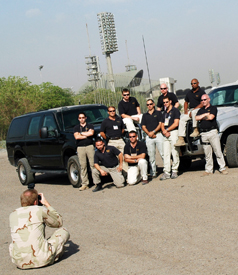This Year, Contractor Deaths Exceed Military Ones in Iraq and Afghanistan
Thursday 23 September 2010
by: T. Christian Miller

Eyrnis security personnel, contracted to provide security for the US Army Corps of Engineers in Iraq, pose at the Baghdad parade field. (Photo: jamesdale10 / WikiMedia)
Labor Department figures show that more than 44,000 contractors have reported injuries since 2001, compared to about 40,000 U.S. troops. The figures are not entirely comparable, since contractor injuries include minor workplace injuries.
More private contractors than soldiers were killed in Iraq and Afghanistan in recent months, the first time in history that corporate casualties have outweighed military losses on America’s battlefields.
More than 250 civilians working under U.S. contracts died in the war zones between January and June 2010, according to a ProPublica analysis of the most recent data available from the U.S. Department of Labor, which tracks contractor deaths. In the same period, 235 soldiers died, according to Pentagon figures.
This milestone in the privatization of modern U.S. warfare reflects both the drawdown in military forces in Iraq and the central role of contractors in providing logistics support to local armies and police forces, contracting and military experts said.
Steven Schooner, a professor of government contracting at George Washington University Law School, said that the contractor deaths show how the risks of war have increasingly been absorbed by the private sector. Private contractors in Iraq and Afghanistan provide fuel, food and protective services to U.S. outposts — jobs once performed by soldiers.
“It’s extremely likely that a generation ago, each one of these contractors deaths would have been a military death,” Schooner said. “As troop deaths have fallen, contractor deaths have risen. It's not a pretty picture.”
Schooner, who conducted a recent study of contractor fatalities published in Service Contractor (PDF), an industry newsletter, said contractors now make up more than 25 percent of total deaths in Iraq and Afghanistan — a proportion that has grown steadily throughout the conflicts. Official figures show that 5,531 troops and 2,008 civilian contract workers have died in Iraq and Afghanistan between the beginning of hostilities in 2001 and June 2010.
Many working under U.S. contracts are local civilians, often working as translators for troops, or are hired from third world countries to do basic labor, such as cleaning kitchens and toilets.
Previous ProPublica stories have noted that companies employing such workers often fail to report their deaths and injuries to the Labor Department, as required by law. Government figures likely understate the total number civilian contractor deaths.
The rising fatalities have received little public attention, concealing the full human cost of the war, Schooner said. When President Obama spoke of troop deaths in Afghanistan earlier this month, he made no mention of fatalities among the private workforce that feeds and fuels U.S. forces.
“I'm not accusing either the Bush or the Obama administration of intentionally deceiving the public,” Schooner said. “But when a president applauds a reduction in military deaths but fails to acknowledge the contractor personnel now dying in their place, someone isn't telling the whole story.”
The wars in Iraq and Afghanistan are the most privatized in American military history. Today, there are 150,000 troops in Afghanistan and Iraq. As of March 2010, there were more than 200,000 private contractors, though that number is believed to have declined with the drawdown of U.S. forces.
Defense Secretary Robert Gates announced a plan last month to sharply reduce the number of contractors, saying the Pentagon has become overly dependent on private workers to carry out jobs once done by soldiers.
A recent Congressional Research Service report (PDF) found that the heavy use of contractors had exposed troops to supply shortfalls, wasted taxpayer money, and stirred anger among locals. In several high-profile incidents, heavily armed private security contractors have killed unarmed Iraqi and Afghan civilians.
“Some analysts believe that poor contract management has also played a role in abuses and crimes committed by certain contractors against local nationals, which may have undermined U.S. counterinsurgency efforts in Iraq and Afghanistan,” the report found.
Marcie Hascall Clark, an advocate for contract workers, said that contractor deaths and injuries reflected contractors’ importance in fighting the wars.
Labor Department figures show that more than 44,000 contractors have reported injuries since 2001, compared to about 40,000 U.S. troops. The figures are not entirely comparable, since contractor injuries include minor workplace injuries.
“I don’t think most contractors expect to be treated as nobly as our soldiers, but they don’t expect to be forgotten, either,” said Hascall Clark, who runs a group called American Contractors in Iraq and Afghanistan. “I think there should definitely be some recognition of what they do.”